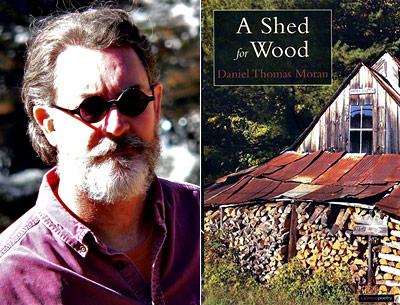What Matters Most

“A Shed for Wood”
Daniel Thomas Moran
Salmon Poetry, $21.95
“A Shed for Wood” begins with a quote from Henry David Thoreau: “The youth gets together his materials to build a bridge to the moon, or perchance, a palace or temple on the earth, and, at length the middle-aged man concludes to build a wood-shed with them.”
The book is dedicated to the memory of Samuel Menashe, Allen Planz, and Siv Cedering, all South Fork poets, deeply revered and recently departed. This, along with the opening quote, is a significant gesture. It speaks directly to the modest mission of poetry, one Daniel Thomas Moran has successfully served. In addition to being the poet laureate of Suffolk County from 2005 to 2007, he was a respected dentist on Shelter Island for many years.
Mr. Moran has made a long and distinguished career of cultivating two worlds into one. “A Shed for Wood” combines the intimate moments of private life with the critical awareness of artistic persona. The work has compassionate precision, coming from someone who knows enough not to say too much.
Here is the place I have found,
of fertile earth between tumbled stone. . . .
Where water spills from mountains,
over and down between hills,
and breaths, on winter nights
are seized by the gelid air. . . .
Where we can be with our aloneness,
at rest with its bottomless still,
and inhabit the life which inhabits us.
That opening poem, “At Davisville, New Hampshire,” represents Mr. Moran’s verse well; it reveals the personal with genuine thought, yet goes beyond the self to become public property. At first, his lines sound deceptively familiar, simple Frostian rhythms in elegant, cosmopolitan vernacular. Upon further reading, they manifest something quite different from the usual, overly serious, confession.
If it were not for the sincerity of Mr. Moran’s existential nature, one might be in the company of an avuncular comic. In “Christmas Eve at the Waldorf Astoria,” the poet meets a porter by the name of Jesus. The poem demonstrates Mr. Moran’s ability to turn an absurd situation into a memorable encounter:
He was shorter
than I might have
imagined, from those
paintings of Caravaggio,
and all of the
crucifixes of my childhood.
The beauty of that aesthetic, besides that it is humorous, is that Mr. Moran genuinely regards his subject matter with palpable gratitude. “A Shed for Wood” is full of praise — tongue-in-cheek and often laugh-out-loud. There is an inherent humanism to the work, full of faith that we will survive difficult occasions.
The poet attends to the minutia of composition with such tangible joy that even acts of eulogy carry benevolent truth.
Out there in the world,
some brittle oak leaves
have survived the worst of it.
They cling, like the rest of us,
beset and shivering on
threads in March’s wind.
That’s from “Thinking About the Death of John Updike,” one of many poems in the collection that address incomprehensible loss, larger than life, on a personal level. There are elegies on a father’s anxiety as his son goes to war, aging friends who receive bad news from their doctors, the decline of an artist’s ability to work, the notoriously short life of a mayfly, a professional wrestler called Killer Kowalski, and the late singer Amy Winehouse, among others.
We would like it to be different.
But it can never be different.
We try to talk about it even more,
as if the words were a salve, but
there are not the right words, not
even the wrong words arranged well.
From “Now, a Month Beyond,” the most painful poem in the collection. It, too, speaks for the civil tone of Mr. Moran’s work. He writes out of necessity, about what matters most to people.
Alfred, Lord Tennyson wrote “ ’Tis better to have loved and lost, than never to have loved at all.” “A Shed for Wood” burns with equal affection and unique imagination. Hank Williams sang “There’s a tear in my beer, ’cause I’m crying for you, dear.” Daniel Thomas Moran also writes of loss, and, in time, reminds us to laugh.
So much for us to know,
all the more to be imagined.
Surely we should not
spare time to grieve.
Our time passes, and we
must pass with it.
From “A Poem of Necessity”
Lucas Hunt is the author of the poetry collection “Light on the Concrete.” The director of Hunt & Light, a poetry publisher, he lives in Springs.
